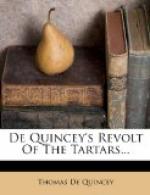and their head, the Lama, in some dark and mysterious
rites of consecration, terminating 30 in oaths
under such terrific sanctions as no Kalmuck would
have courage to violate. As far, therefore, as
regarded the personal share of the Khan in what was
to come, Zebek was entirely at his ease; he knew him
to be so deeply pledged by religious terrors to the
prosecution of the conspiracy that no honors within
the Czarina’s gift could have possibly shaken
his adhesion; and then, as to threats from the same
quarter, he knew him to be sealed against those fears
by others of a gloomier character, 5 and better
adapted to his peculiar temperament. For Oubacha
was a brave man, as respected all bodily enemies or
the dangers of human warfare, but was as sensitive
and timid as the most superstitious of old women in
facing the frowns of a priest or under the vague anticipations
10 of ghostly retributions. But had it been
otherwise, and had there been any reason to apprehend
an unsteady demeanor on the part of this prince at
the approach of the critical moment, such were the
changes already effected in the state of their domestic
politics amongst 15 the Tartars by the
undermining arts of Zebek-Dorchi, and his ally the
Lama, that very little importance would have attached
to that doubt. All power was now effectually
lodged in the hands of Zebek-Dorchi. He was the
true and absolute wielder of the Kalmuck sceptre;
all measures 20 of importance were submitted
to his discretion, and nothing was finally resolved
but under his dictation. This result he had brought
about, in a year or two, by means sufficiently simple:
first of all, by availing himself of the prejudice
in his favor, so largely diffused amongst
25 the lowest of the Kalmucks, that his own title
to the throne in quality of great-grandson in a direct
line from Ajouka, the most illustrious of all the
Kalmuck Khans, stood upon a better basis than that
of Oubacha, who derived from a collateral branch;
secondly, with respect 30 to the sole
advantage which Oubacha possessed above himself in
the ratification of his title, by improving this difference
between their situations to the disadvantage of his
competitor, as one who had not scrupled to accept
that triumph from an alien power at the price of his
independence, which he himself (as he would have it
understood) disdained to court; thirdly, by his own
talents and address, coupled with the ferocious energy
of his moral character; fourthly—and perhaps
in an equal 5 degree—by
the criminal facility and good nature of Oubacha;
finally (which is remarkable enough, as illustrating
the character of the man), by that very new modelling
of the Sarga, or Privy Council, which he had used
as a principal topic of abuse and malicious insinuation
10 against the Russian Government, whilst,
in reality, he first had suggested the alteration
to the Empress, and he chiefly appropriated the political




